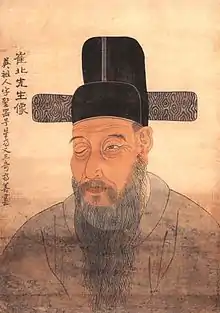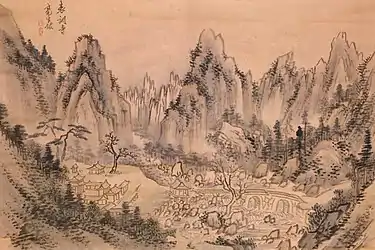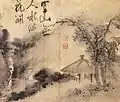Choe Buk
Choe Buk (Korean: 최북; fl. 1755–85), was a Korean painter of the late Joseon period. He used many art names including Samgijae, Hosaenggwan, Songjae, Giam, and Geogijae.
| Choe Buk | |
 | |
| Korean name | |
|---|---|
| Hangul | 최북 |
| Hanja | 崔北 |
| Revised Romanization | Choe Buk |
| McCune–Reischauer | Ch'oe Puk |
| Art name | |
| Hangul | 호생관, 삼기재, 거기재 |
| Hanja | 毫生館, 三奇齋, 居其齋 |
| Revised Romanization | Hosaenggwan, Samgijae, Geogijae |
| McCune–Reischauer | Hosaenggwan, Samgijae, Kŏgijae |
| Courtesy name | |
| Hangul | 성기, 유용 |
| Hanja | 聖器, 有用 |
| Revised Romanization | Seonggi, Yuyong |
| McCune–Reischauer | Sŏnggi, Yuyong |
Life
His childhood remains unknown, as well as the social status of his family. The Grove says 'floruit c. 1755–85'.[1] Nevertheless, the Korean wiki page ko:최북 says: 최북(崔北, 1712년 – 1760년)은 조선 숙종, 영조 때의 화가이다 ... and gives a reference to AKS [2] ... that explains why 1720 can be guessed as his birth year.
It seems that, despite the fame of Choe Buk in Seoul, his excessive drinking left him perpetually short of cash, and he resorted to making trips to other cities to sell his works. He may have died in Seoul, but the year remains unrecorded.
He was known as a skilled landscape painter, but also drew portraits, flowers and animals. Legend tells of a powerful aristocrat that forced him to draw, but Choe refused to do so and as a result had one eye pierced, leading to the loss sight in that eye.[3]
He was known to have traveled in Japan and was known to Zheng Zhilong's family; painting an image of Zheng's wife and their son Koxinga. The original returned to Korea with Choe, but a copy was kept with the family and was later emulated by Bak Jega.[4]
Style and Galleries
Choe Buk was acquainted with Kim Hong-do, Kim Deuk-sin, Yi In-mun, but his works are dissimilar to theirs.

The Korean Copyright Commission [5] lists 20 paintings for Choe Buk, while Towooart[6] gives a short notice.
 Pyohun Temple
Pyohun Temple
금강산 표훈사도 Jo-eo Landscape
Jo-eo Landscape
조어산수 Cho-ok Landscape
Cho-ok Landscape
초옥산수 Bull riding
Bull riding
맹우도(려우귀가)
See also
References
- Turner 2003, p. (07)184
- http://people.aks.ac.kr/view.jsp?id=PPL_6JOc_A9999_1_0013586 (in Korean)
- "Painter Choe Buk". Naenara. May 29, 2020. Retrieved January 7, 2021.
He was good at drawing portraits, landscapes, flowers and animals. He was so skillful in drawing landscapes that he was nicknamed "landscape painter Choe". [...] Poor as he was, he liked drawing beautiful scenery of the country, but he never drew pictures pleasing the feudal ruling circles.
- Park, J.P. (2018). A New Middle Kingdom: Painting and Cultural Politics in Late Chosŏn Korea (1700–1850). University of Washington Press. p. 296. ISBN 978-0295743264.
- "공유마당 > 이미지검색". gongu.copyright.or.kr. Archived from the original on 3 July 2013. Retrieved 27 January 2022.
- http://www.towooart.com/oldart/old_korea/choibuk/choibuk.htm (in Korean)
Bibliography
- Turner, Jane (2003). Grove Dictionary of Art. Oxford University Press, USA. p. 32600. ISBN 978-0-1951-7068-9.
External links
- Arts of Korea, an exhibition catalog from The Metropolitan Museum of Art Libraries (fully available online as PDF), which contains material on Choe Buk